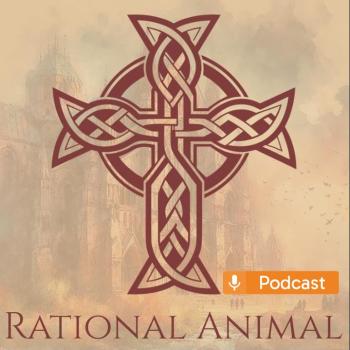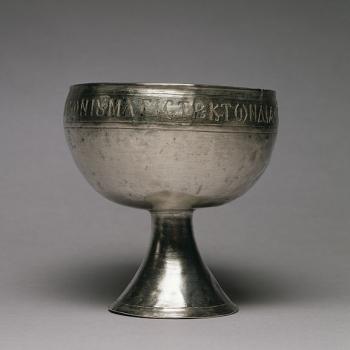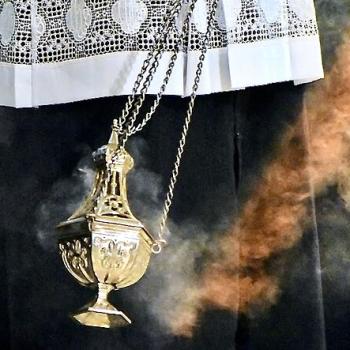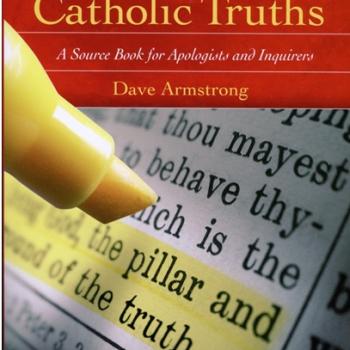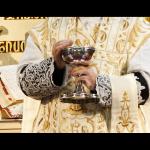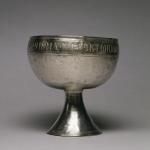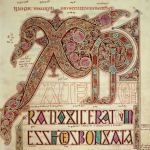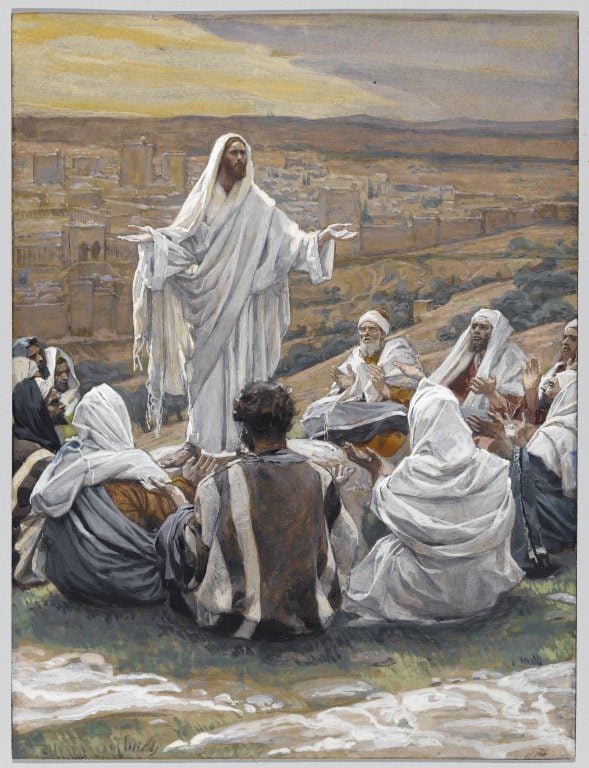
The Lord’s Prayer, by James Tissot (1836-1902) [public domain / Wikimedia Commons]
***
(11-7-08)
***
A self-described Hebrew Catholic asked on the Coming Home Network board:
The Catechism and the RSV translate Gk opheilemata as trespasses in the Lord’s Prayer (Mt 6:12), when it manifestly means debts — both in the NT usage (Rm 4:4) and in the Septuagint (Dt 24:10). Why?
The concept of sins as debts is a midrash that ties in the Year of Jubilee (Lv. 25) in which all financial debts are forgiven, the coming of Messiah (Is 61:1-2) which Yeshua applies to himself (Lk 4:21), and the Lord’s Prayer (Mt 6:12). Dead Sea Scroll 11QMelchizedek portrays Melchizedek as a Messianic figure come to forgive sins as “debts” with this same idea. So it is an important 2nd Temple Jewish idea with real roots in the Tanakh.
So, why does the RSV and the Catechism mistranslate it? Losing the entire OT connections of the midrash?
It is very confusing to pray the Lord’s prayer with others, some of whom use “trespasses”, some “debts”, some “sins” (Lk 11:4, although later on in the verse hamartia (sins) is paralleled withopheilonti (debts).
Why did the Catechism choose trespasses?
First of all, in my RSV (which is the non-Catholic standard version), Matthew 6:12 has “debts” and “debtors.” “Trespasses” occurs at Matthew 6:14-15, but it is a different Greek word than what you note (see below). I thought perhaps the RSV-CE (Catholic edition) might be different. The Wikipedia article on RSV-CE doesn’t list Matthew 6:12 at all. The EWTN Bible Search for RSV-CE has “And forgive us our debts, [opheilema] As we also have forgiven our debtors”.
[later note: I’ve been informed that the RSV-CE2 (second Catholic edition) has “trespass” for Matthew 6:12]
I don’t know Greek and am no expert on translation, but I can go to various lexical references in my library and online (designed for regular old folks like me) to get an idea of what the Greek means (and to speculate why RSV-CE2 chose this rendering for Matthew 6:12). We can also speculate upon the rationale behind the liturgical usage of “trespass” in the (English-speaking) Catholic Church.
Kittel’s Theological Dictionary of the New Testament (one-volume, p. 747) states:
In later Judaism it [opheilema] is a common term for “sin.” In the NT it occurs in Mt. 6:12 for “debt” in the sense of “sin” (cf. hamartia in Lk. 11:4).
I think this is possibly the key to understanding the rendering of “trespass” which might be regarded as a synonym (in English) for “sin.” You yourself noted Luke 11:4 as the parallel passage:
Matthew 6:9-13 (RSV / RSV-CE) Pray then like this: Our Father who art in heaven, Hallowed be thy name. Thy kingdom come. Thy will be done, On earth as it is in heaven. Give us this day our daily bread; And forgive us our debts, [opheilema] As we also have forgiven our debtors [opheiletes]; And lead us not into temptation, But deliver us from evil.
Luke 11:2-4 And he said to them, “When you pray, say: “Father, hallowed be thy name. Thy kingdom come. Give us each day our daily bread; and forgive us our sins [hamartia], for we ourselves forgive every one who is indebted [opheilo] to us; and lead us not into temptation.”
So we have a scenario in the synoptics with two Greek words being used for what was obviously the same address (the Lord’s Prayer or Our Father). We compare Scripture with Scripture, for a more accurate understanding. Hamartia is translated as “sin” 172 times in the KJV, as “sinful” once and as “offence” once. Its cognate hamartano is rendered “sin” 39 times, “offend” once, and as “trespass” three times in the KJV. Here are those three instances:
Matthew 18:15 Moreover if thy brother shall trespass against thee, go and tell him his fault between thee and him alone: if he shall hear thee, thou hast gained thy brother.
Luke 17:3-4 Take heed to yourselves: If thy brother trespass against thee, rebuke him; and if he repent, forgive him. And if he trespass against thee seven times in a day, and seven times in a day turn again to thee, saying, I repent; thou shalt forgive him.
Compare to the RSV:
Matthew 18:15 “If your brother sins against you, go and tell him his fault, between you and him alone. If he listens to you, you have gained your brother.
Luke 17:3-4 Take heed to yourselves; if your brother sins, rebuke him, and if he repents, forgive him; and if he sins against you seven times in the day, and turns to you seven times, and says, `I repent,’ you must forgive him.”
RSV habitually translates hamartia or hamartano as “sin”. “Trespass” occurs 22 times in the NT in the RSV, but not as a rendering of or its opheilema cognates. It is the translation of the Greek paraptoma, where it is clearly synonymous with “sin”:
Matthew 6:14-15 For if you forgive men their trespasses, your heavenly Father also will forgive you; but if you do not forgive men their trespasses, neither will your Father forgive your trespasses.
Mark 11:25 And whenever you stand praying, forgive, if you have anything against any one; so that your Father also who is in heaven may forgive you your trespasses.”
Romans 4:25 who was put to death for our trespasses and raised for our justification.
Romans 5:15-18, 20 But the free gift is not like the trespass. For if many died through one man’s trespass, much more have the grace of God and the free gift in the grace of that one man Jesus Christ abounded for many. And the free gift is not like the effect of that one man’s sin [hamartano]. For the judgment following one trespass brought condemnation, but the free gift following many trespasses brings justification. If, because of one man’s trespass, death reigned through that one man, much more will those who receive the abundance of grace and the free gift of righteousness reign in life through the one man Jesus Christ. Then as one man’s trespass led to condemnation for all men, so one man’s act of righteousness leads to acquittal and life for all men. . . . Law came in, to increase the trespass; but where sin [hamartia] increased, grace abounded all the more,
[Note how “trespass” (though here it is paraptoma) and sin (hamartia) are used interchangeably and synonymously in this passage:
5:15 one man’s trespass
5:16 one man’s sin
5:16 one trespass
5:17 one man’s trespass
5:18 one man’s trespass
5:16 the free gift following many trespasses brings justification
5:20 but where sin increased, grace abounded all the more ]
Romans 11:11-12 So I ask, have they stumbled so as to fall? By no means! But through their trespass salvation has come to the Gentiles, so as to make Israel jealous. Now if their trespass means riches for the world, and if their failure means riches for the Gentiles, how much more will their full inclusion mean!
2 Corinthians 5:19 that is, in Christ God was reconciling the world to himself, not counting their trespasses against them, and entrusting to us the message of reconciliation.
Galatians 6:1 Brethren, if a man is overtaken in any trespass, you who are spiritual should restore him in a spirit of gentleness. Look to yourself, lest you too be tempted.
Ephesians 1:7 In him we have redemption through his blood, the forgiveness of ourtrespasses, according to the riches of his grace
Ephesians 2:1, 5 And you he made alive, when you were dead through the trespasses and sins [hamartia]. . . even when we were dead through our trespasses, made us alive together with Christ (by grace you have been saved),
Colossians 2:13 And you, who were dead in trespasses and the uncircumcision of your flesh, God made alive together with him, having forgiven us all our trespasses,
Paraptoma is translated as sin in one place:
James 5:16 Therefore confess your sins to one another, and pray for one another, that you may be healed. The prayer of a righteous man has great power in its effects.
It appears, then, that the Catholic liturgical tradition and the Catechism and RSV-CE2 are taking the overall thought of all these related passages into consideration, in choosing “trespass” — even though a solid linguistic argument can be made (and you made it) for preferring “debtor.”
The Catechism has “trespasses” at #2759 but “debts” at #2841 and #2845.
But why is “trespass” the Catholic version for the Lord’s Prayer? The Latin Vulgate rendering and the language in the Latin Mass are, literally, “debts” and “debtors”:
et dimitte nobis debita nostra, sicut et nos dimittimus debitoribus nostris
Wikipedia, “Lord’s Prayer” states:
Though Matthew 6:12 uses the term debts, the older English versions of the Lord’s Prayer uses the term trespasses, while ecumenical versions often use the term sins. The latter choice may be due to Luke 11:4, which uses the word sins, while the former may be due to Matthew 6:12 (immediately after the text of the prayer), where Jesus speaks oftrespasses. As early as the third century, Origen of Alexandria used the word trespasses (παραπτώματα) in the prayer. Though the Latin form that was traditionally used in Western Europe has debita (debts), most English-speaking Christians (except Presbyterians and others of the Reformed tradition), use trespasses. . . .
Matthew continues with a request for debts to be forgiven in the same manner as people forgive those who have debts against them. Luke, on the other hand, makes a similar request about sins being forgiven in the manner of debts being forgiven between people. The word “debts” (ὀφειλήματα) does not necessarily mean financial obligations as shown by the use of the verbal form of the same word (ὀφείλετε) in passages such as Romans 13:8. In Aramaic the word for debt is also used to mean sin. This difference between Luke’s and Matthew’s wording could be explained by the original form of the prayer having been in Aramaic. The generally accepted interpretation is thus that the request is for forgiveness of sin, not of supposed loans granted by God. . .
The article gives the form as it appeared in the 1662 Book of Common Prayer (Anglican):
Our Father, which [who] art in heaven,
hallowed be thy name;
thy kingdom come;
thy will be done,
in [on] earth as it is in heaven.
Give us this day our daily bread.
And forgive us our trespasses,
as we forgive them that [those who] trespass against us.
And lead us not into temptation;
but deliver us from evil.
[For thine is the kingdom,
the power, and the glory,
For ever and ever.
Amen.]
This is almost word-for-word identical to the words used in the Catholic Mass and in the Catechism (#2759). I have inserted the Catholic differences in blue. Therefore, it appears that “trespass” is the accepted English liturgical usage of the prayer as passed down; influenced by the lofty Elizabethan language of the Book of Common Prayer, just as the RSV is the continuation of the (Protestant) KJV tradition of Bible translation.
Dr. Orville Boyd Jenkins noted:
Do you know the reason for the different forms of the Lord’s Prayer? These two common variations of the “Lord’s Prayer” are from two different English translations of Matthew’s version of the prayer (Matt. 6:12).
The “debts” form is from the first English translation of the Bible, by John Wycliffe in 1395 (Wycliffe spelling “dettis”)! The “trespasses” version is from the 1526 translation by William Tyndale (Tyndale spelling “treaspases”).
In 1549 the first Book of Common Prayer in English used a version of the prayer with “trespasses.” This became the “official” version used in the Anglican congregations.
Nicholas Ayo, in his book, The Lord’s Prayer (Roman & Littlefield, 2003) gives us further insight:
Matthew’s debts shows a more Semitic usage. The Aramaic word for sins was debts, with the primary analogue financial debts. To the Greek Gentile Christians of Luke’s community, however, sins would be more understandable. The Greeks knew sin, or hamartia, as literally a missing of the mark, an arrow gone astray, an error or mistake, a falsity of some kind. (p. 72)
Ayo, on the same page, traces the use of “trespass” in English to Wycliffe’s translation of the passage following the Our Father (Matthew 6:14): a practice retained by the KJV and the RSV. Wycliffe used “debts” in the prayer itself, as noted above. Tyndale used “trespasses” in both Matthaean passages and even in Luke’s version, where the Greek is different. Ayo continues:
Jerome translated the Greek word paraptoma (transgressions) . . . by an alternate use of two Latin words, peccata (sins) and delicta (offenses). Wycliffe rendered those two Latin words with the English words “sins” and “trespasses.”
Catholic Bible translator Ronald Knox uses trespass at Matthew 6:12 and also Luke 11:4. Since his version was a revised Vulgate, he either had some linguistic reason to do so, or else he was bowing to the liturgical tradition in English at that point.
Bible translator and commentator William Barclay, in his book, The Lord’s Prayer (Westminster John Knox Press, 1998) provides yet further fascinating speculation:
It may well be that Tyndale did not wish to use the word debts, because there were those who desired to take this petition . . . as a statement in the money sense of the term are obliterated and need no longer be paid. Augustine (The Sermon on the Mount 2.8) in point of fact spends the greater part of his exposition of this petition dealing with the obviously not inconvenient interpretation which found in this petition a new way to abolish old debts. (p. 87)
Finally, here is St. Augustine’s commentary on the Sermon on the Mount, Book II, chapter 8, section 28 (complete):
The fifth petition follows: “And forgive us our debts, as we also forgive our debtors.” It is manifest that by debts are meant sins, either from that statement which the Lord Himself makes, “You shall by no means come out thence, till you have paid the uttermost farthing;” or from the fact that He called those men debtors who were reported to Him as having been killed, either those on whom the tower fell, or those whose blood Herod had mingled with the sacrifice. For He said that men supposed it was because they were debtors above measure, i.e. sinners, and added “I tell you, Nay: but, unless you repent, you shall all likewise die.” Here, therefore, it is not a money claim that one is pressed to remit, but whatever sins another may have committed against him. For we are enjoined to remit a money claim by that precept rather which has been given above, “If any man will sue you at the law, and take away your coat, let him have your cloak also;” nor is it necessary to remit a debt to every money debtor; but only to him who is unwilling to pay, to such an extent that he wishes even to go to law. “Now the servant of the Lord,” as says the apostle, “must not go to law.” And therefore to him who shall be unwilling, either spontaneously or when requested, to pay the money which he owes, it is to be remitted. For his unwillingness to pay will arise from one of two causes, either that he has it not, or that he is avaricious and covetous of the property of another; and both of these belong to a state of poverty: for the former is poverty of substance, the latter poverty of disposition. Whoever, therefore, remits a debt to such an one, remits it to one who is poor, and performs a Christian work; while that rule remains in force, that he should be prepared in mind to lose what is owing to him. For if he has used exertion in every way, quietly and gently, to have it restored to him, not so much aiming at a money profit, as that he may bring the man round to what is right, to whom without doubt it is hurtful to have the means of paying, and yet not to pay; not only will he not sin, but he will even do a very great service, in trying to prevent that other, who is wishing to make gain of another’s money, from making shipwreck of the faith; which is so much more serious a thing, that there is no comparison. And hence it is understood that in this fifth petition also, where we say, “Forgive us our debts,” the words are spoken not indeed in reference to money, but in reference to all ways in which any one sins against us, and by consequence in reference to money also. For the man who refuses to pay you the money which he owes, when he has the means of doing so, sins against you. And if you do not forgive this sin, you will not be able to say, “Forgive us, as we also forgive;” but if you pardon it, you see how he who is enjoined to offer such a prayer is admonished also with respect to forgiving a money debt.
***






